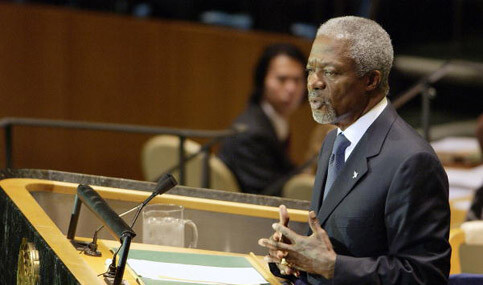United Nations News Service 28 June 2006

Secretary-General Kofi Annan addressing the General Assembly. (UN/Evan Schneider)
Calling on all sides in the upsurge of violence in the Gaza Strip to exercise maximum restraint and ensure that civilians are not harmed, United Nations Secretary-General Kofi Annan said today the first step towards a solution would be the release of the Israeli soldier kidnapped[*] by Palestinian militants.
“I’ve been following with great concern developments in the Middle East,” Mr. Annan told reporters at UN Headquarters in New York, noting that he had been in touch with Palestinian President Mahmoud Abbas, Israeli Prime Minister Ehud Olmert and Syrian President Bashar al Assad.
He said he was “really working with everyone to try and calm down the situation. Obviously we cannot condone the use of Katyushas that place Israelis at risk and the Israeli Government has the responsibility to protect its citizens but it has to do so with restraint,” he added.
“And of course it is understandable that they would want to go after those who kidnapped the soldier but it has to be done in such a way that the civilian population are not made to suffer.”
He stressed that it was important that the two leaders work together to calm the situation, and said Mr. Olmert had indicated he was exercising maximum restraint following Israel’s incursion into the Gaza Strip.
Asked what he thought would be the key to the solution, he replied: “I think the first thing they will have to do, that everyone seems concerned about, is the release of the kidnapped soldier. I think that will really help peace matters.”
On reported Israeli overflights over Mr. Assad’s house, Mr. Annan said: “If it is correct, we need to be very careful not only not to escalate or to expand the area of conflict, and so it is very important that we all take very careful steps to deescalate and not take any action or initiative that would expand or escalate the situation.”
He was asked whether he got any assurance from the Israelis that they would pull out and try a diplomatic initiative. “Well, not directly,” he replied. “But I think the Prime Minister indicated to me they are exercising maximum restraint.”
He noted Mr. Olmert’s concern over the firing of several Katyusha rockets into Israel, and said Mr. Abbas had told him he was working with the Palestinian factions to bring the violence under control and ensure the Katyusha attacks do not continue.
“And I think it is important that we work very actively on this to get it done,” he added. “But I hope they (Israelis) would also allow time for a diplomatic initiative to the capture of the soldier and I hope no action will be taken to harm him and that he will be returned alive.”
Mr. Annan said he was not envisaging sending an envoy to the region at this stage but was in touch with other leaders “to see how collectively we can help the situation.” He again stressed the welfare of civilians caught up in the conflict: “You need to be careful not to take any action in any area which is likely to harm civilians.”
[*]Editor’s Note: The dictionary definition of the word “kidnap” necessitates that the abduction of a person is illegal. As the Israeli soldier was part of an occupying force, captured during a military raid against a military target, in international law he is considered to be a “prisoner of war”, not a kidnap victim. The rules governing the treatment of prisoners of war are spelled out in the third Geneva Convention of 1949, article 13 of which requires that POWs “must at all times be treated humanely”.
Related Links